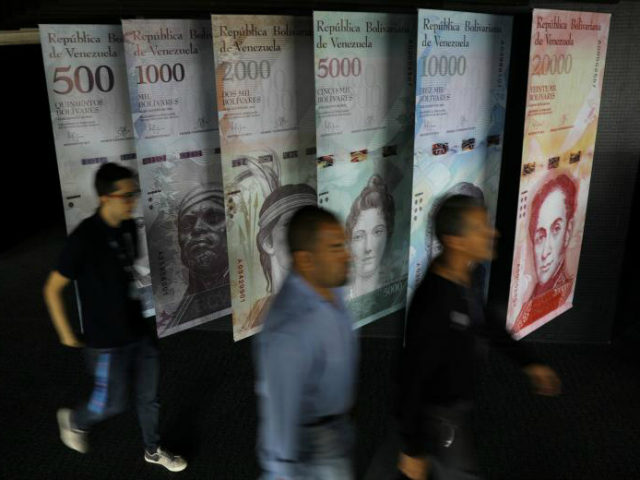The latest triumph of socialist economics from Venezuela is a 64 percent devaluation of the national currency, setting the price of each crisp U.S. dollar bill at a staggering 2,010 bolivars.
The previous rate was 721 bolivars to the dollar, and that was after a 72 percent devaluation in February 2016.
“Complex currency controls, enacted first in 2003 in order to prevent capital flight, are thought by many to be behind Venezuela’s economic crisis, which has left millions suffering food and medicine shortages,” says Reuters, in a report that notes this is the fifth major currency control plan in four years.
“Most Venezuelans say they cannot get access to official exchange rates anyway and so must go to the black market, on which the bolivar currency has collapsed more than 99 percent against the dollar since President Nicolas Maduro won the presidency in 2013,” Reuters adds.
AFP cites socialist dictator Nicolás Maduro describing the currency crash as an effort to “undermine the black market.” It is not likely to undermine that market much because people are still willing to pay 6,000 bolivars to the dollar for black market purchases. They flock to the black market because they are only allowed to buy $500 U.S. per quarter. Also, the black marketeers are selling food.
On the other hand, the president of the central bank, Pedro Maldonado, hailed the currency devaluation as “an unequivocal indication that we are beginning a process of economic recovery.”
That might be a hard sell to Venezuelans who socked away $1,000 worth of currency four years ago and discover it is now worth about five bucks, as the Yahoo article points out. They will likely suspect the latest round of currency games are intended to help the Maduro government more than his starving citizens. As Eurasia Group analysts put it to Bloomberg Markets, “The devaluation will provide the government with some fiscal benefits, but the impact will be somewhat limited.”
The central bank only sold about $24 million U.S. in the latest auction, primarily to import companies. Economist Jesus Casique pronounced this amount “laughable” to AFP and said it demonstrated a “lack of currency” in the troubled nation’s coffers.
Casual readers of the financial papers might be wondering, “Say, didn’t Venezuela just sell a huge pile of oil bonds at fire-sale prices for quick cash?” Yes, indeed they did. They sold $2.8 billion worth, to be exact. Only $24 million in hard foreign currency went up for sale. Casique saw the bond sale as a sign that the Maduro regime knows its currency games will not boost productivity and reverse the economic death spiral.
“They decided to cash in the PDVSA bond with a discount of 69 percent to give the official exchange rate a breathing space,” he said. That is what enraged opposition leaders, who accused big bond buyers like Goldman Sachs of propping up Maduro with their hard cash.
Analyst Siobhan Morden of Japanese investment bank Nomura Securities, which bought $100 million worth of Venezuelan bonds in that controversial auction, basically accused the Maduro regime of using its dwindling pile of hard currency to stave off the political consequences of turning an oil-rich nation into a starvation-wracked basket case. In the clinical terms of an investment analyst, she explains that currency devaluations will never stabilize the market or undermine the black market, not while the dead hand of Hugo Chavez steers the ship of state through his protege Maduro.
“The reaffirmation of the status quo reflects still an obvious disconnect of the current administration to the current economic and political realities,” she writes, declaring that Nomura will remain focused on “the political crisis and the increasing optionality for regime change that would then invite serious economic reform.”
At least 60 people have been killed exploring that “optionality for regime change” on the streets of Venezuela. Their anger at foreign investors who thwart regime change by pumping solid money into Maduro’s coffers is growing.
Cynics might say companies like Nomura and Goldman Sachs will now want Maduro gone so they can start making money on the bonds they bought at 31 cents on the dollar, thanks to the devastation of socialism. People reduced to eating household pets to survive are generally quite cynical.

COMMENTS
Please let us know if you're having issues with commenting.